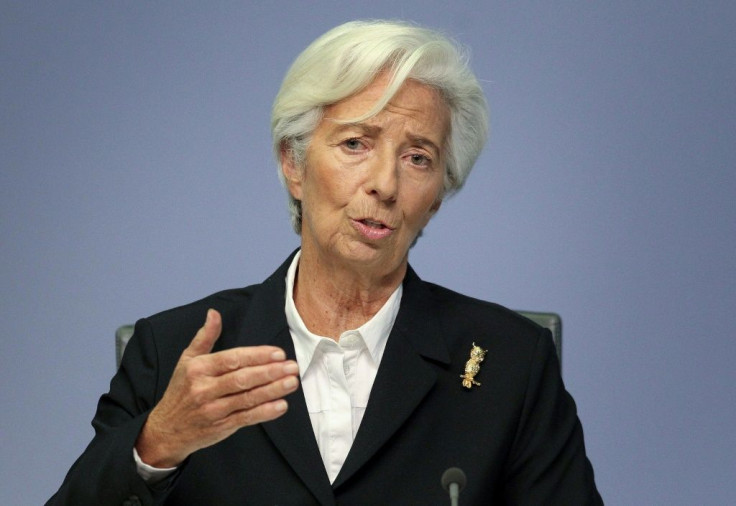Markets Await 'Clearer' ECB Language On Stimulus Path
The European Central Bank is expected to make it clear Thursday that monetary stimulus will keep flowing as concerns grow over economic risks from the latest, fast-spreading coronavirus variant.
The ECB's 25-member governing council is unlikely to tweak ultra-loose monetary policies at a meeting it holds every six weeks, observers say.
But the Frankfurt institution is set to unveil a new-look "forward guidance" statement that will be scoured by investors for clues about future moves on interest rates and bond purchases.
ECB President Christine Lagarde has described Thursday's meeting as "important" and told Bloomberg News it would bring "interesting variations and changes" in how the bank communicates with the public.
It comes just two weeks after the ECB announced a new inflation target of two percent for the eurozone, ditching the "close to, but below two percent" target that had been in place for 18 years.
The bank's revamped forward guidance is expected to be "shorter, clearer, crisper, and more straightforward" said Frederik Ducrozet of Pictet Wealth Management.

The most obvious change would be the mention of the new inflation target, the result of an 18-month strategic review at the ECB -- the first since 2003.
Observers nonetheless expect the ECB to reiterate that interest rates will stay at record low and even negative levels until inflation is firmly on target.
No tweaks are expected either to the ECB's 1.85 trillion euro ($2.2 trillion) pandemic emergency bond-purchasing programme (PEPP), set to run until at least March 2022.
The massive monthly bond buys are aimed at keeping borrowing costs low to encourage spending and investment in the 19-nation currency club.
Although disagreement has emerged between ECB governors about when to start winding down the stimulus, "the recent surge in new Covid cases is likely to tip the balance of risks away from an early curtailment of the PEPP," said Ducrozet.
A solid economic rebound is underway across the eurozone thanks to mass vaccinations and the easing of pandemic-related restrictions.
But the virus' Delta variant is driving up cases again, forcing renewed restrictions in several countries.

Lagarde has described the new two-percent inflation mark as a more "simple" and "symmetric" goal, meaning the bank will allow inflation to temporarily overshoot or undershoot before stepping in.
She stressed however that the ECB was not going as far as the US Federal Reserve in offering more leeway for fluctuations.
The Fed last year said it would allow inflation to rise above 2.0 percent "for some time" before raising interest rates, to boost employment.
Eurozone inflation has remained low for years.
But the region has recently seen a surge in consumer prices, fuelled by one-off factors linked to the pandemic such as post-lockdown demand and shortages of semiconductors and timber.
Former French finance minister Lagarde has repeatedly pledged to "look through" the spike, insisting that the eurozone still needs ample support to get through the pandemic crisis.
"The new strategy, in our view, implies more patience but not necessarily immediate additional" measures, said Natixis economists in a client note.
The ECB's most recent estimates predict that inflation will reach 1.4 percent in 2023.
Many analysts say the ECB is likely to hold off making policy changes until the next meeting in September, when the bank will have fresh inflation and growth estimates.
Once the ECB does decide to start weaning markets off PEPP, it could ease the transition by increasing its pre-pandemic purchases of government and corporate bonds, some observers say.
The pre-pandemic scheme is currently running at a pace of 20 billion euros a month.
© Copyright AFP 2024. All rights reserved.











